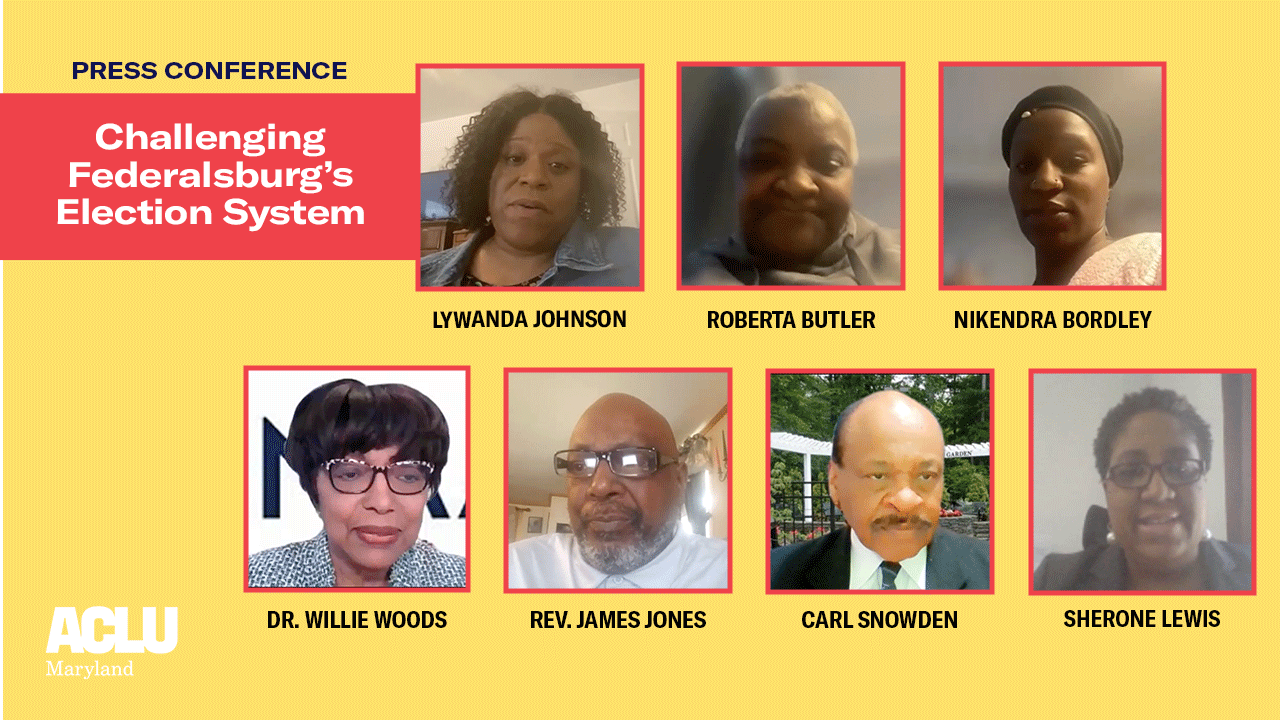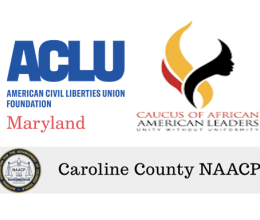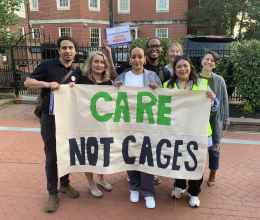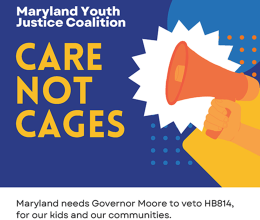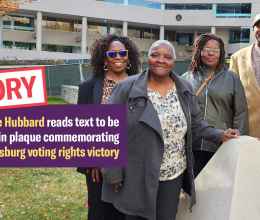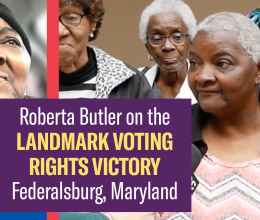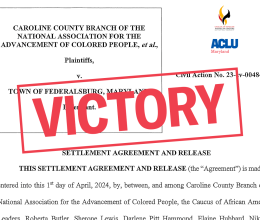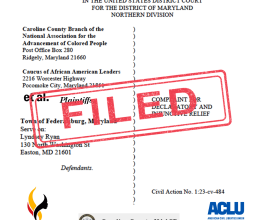
WHAT: Court hearing on Black voters’ motion for preliminary injunction in Caroline County NAACP v. Federalsburg
WHERE: United States District Court, 101 W. Lombard St., Courtroom 7C, Baltimore, MD
WHEN: Tuesday, May 9, 9:30 a.m.
FEDERALSBURG, MD – Rising up to challenge their government’s 200-year history of racial oppression and all-white rule, Black voters of the Town of Federalsburg are asking U.S. District Judge Stephanie Gallagher to grant a preliminary injunction ordering the Town’s all-white government to put in place a new election system that fully addresses longstanding vote dilution -- in time for municipal elections scheduled for this September. To justify overhaul of the Town’s election system, the Plaintiffs rely on extensive expert analysis and powerful testimonial evidence from the Town’s Black voters laying bare the irreparable harms inflicted over many decades by the Town’s entrenched system of all-white rule.
“It is so incredibly important to have representation after not having it for 200 years,” said Sherone Lewis, a Black voter from Federalsburg who is also an official with the Caroline County NAACP. “Two hundred years is too long, and what an opportunity it would be to finally have Black votes count, and to at last elect representatives who could really address the needs of the Black members of this Town.”
Black residents account for fully 47 percent of Federalsburg’s overall population, yet Federalsburg’s government has been all white throughout its history. Now, in the Town’s bicentennial year, the Caroline County Branch of the NAACP, the Caucus of African American Leaders and seven individual Black voters assert that Federalsburg’s election practices, including its longstanding use of an at-large, staggered term election system, and its various 2023 proposals to modify the system and/or cancel 2023 elections altogether, violate the Voting Rights Act by interacting “with social and historical conditions to cause an inequality in the opportunities enjoyed by black and white voters to elect their preferred representatives.”
Yet without ever contesting or even mentioning the compelling proof of racial discrimination and oppression put forth by Black Federalsburg voters, Town officials now seek to evade court review, outrageously contending that despite their undisputed testimony, Black voters have not suffered and will not suffer any injury if the Court rejects their request for justice.
Consistent with their routine practices of silencing, disrespecting, and excluding Black residents, the Town’s white officials argue that the Court should stand by and allow them to go about the business of governance in the same way they have always done things in the past. This, they claim, is because Federalsburg officials are in the process of unilaterally “mooting” Black voters’ claims by adjusting the election system as they see fit. Alternatively, the Town argues that Plaintiffs’ challenge is not “ripe,” and that the Court should hold off on intervening until the Town has more time to see how its plan plays out and whether it is challenged by referendum. Black voters push back hard, describing the Town’s approach as “bully tactics” and depicting its proposal for reform as “entirely illusory and inadequate.”
“It seems almost unimaginable that in the year 2023 -- in a community that is half Black but has an election system that has blocked any Black person from ever being elected to public office – Federalsburg officials would be arguing that Court should make the Town’s Black residents wait longer still for seats at the table,” said ACLU of Maryland Legal Director Deborah Jeon.
“The Black community has spoken, and they demand change,” said ACLU Staff Attorney Nick Taichi Steiner. “Federalsburg’s legacy over the past 200 years was precisely what the Voting Rights Act was intended to reverse. Now, at long last, the Black community will have their day in court to defend their indispensable right to vote.”
Why do Black voters object to the Town’s proposal for election reform?
- Although the Town proposes to replace the at-large structure with two two-member districts, neither of the districts is required to be majority Black in population.
- By retaining staggered election terms, and dictating that only one candidate be elected from each district in 2023 with two white incumbents holding over, the Town’s proposal ensures continued white domination in three of the four council seats, until at least 2025.
- By using the Town’s ordinary legislative process to address the Plaintiffs’ race discrimination claims, the Town strips the “remedy” of federal legal protection. This subjects Black voters’ fundamental rights to popular referendum and threatens to suspend reform entirely if a petition effort moves forward.
For these reasons, Federalsburg’s Black voters are asking Judge Gallagher to reject the Town’s proposal and order the Town “to implement a remedy that fully addresses the rights violations they have established in time for the Town’s 2023 elections, and that protects their right to this hard-fought remedy from being overturned by white residents in a popular referendum.”
The Plaintiffs say they are hopeful that Federalsburg’s bicentennial year will be a truly historic one for the Town’s Black residents:
“For far too long, Federalsburg has been run by and for the benefit of only its white residents,” said Carl Snowden, Convener of the Caucus of African American Leaders. “It may have been a long time coming, but I believe the chimes of justice are finally tolling for Caroline County and the Town of Federalsburg.”
Black voters in the case are represented by Nicholas Taichi Steiner and Deborah Jeon of the ACLU of Maryland, along with Cori Schreider, Katie Aber, and Daniel Wolfe of the Washington, D.C. law firm Crowell & Moring LLP.
